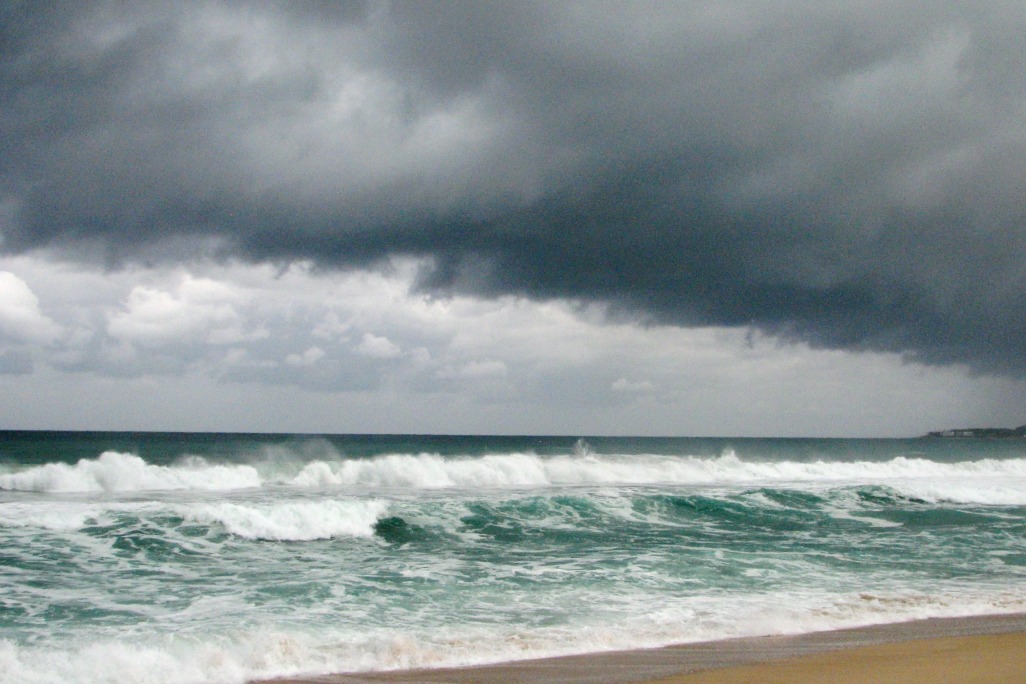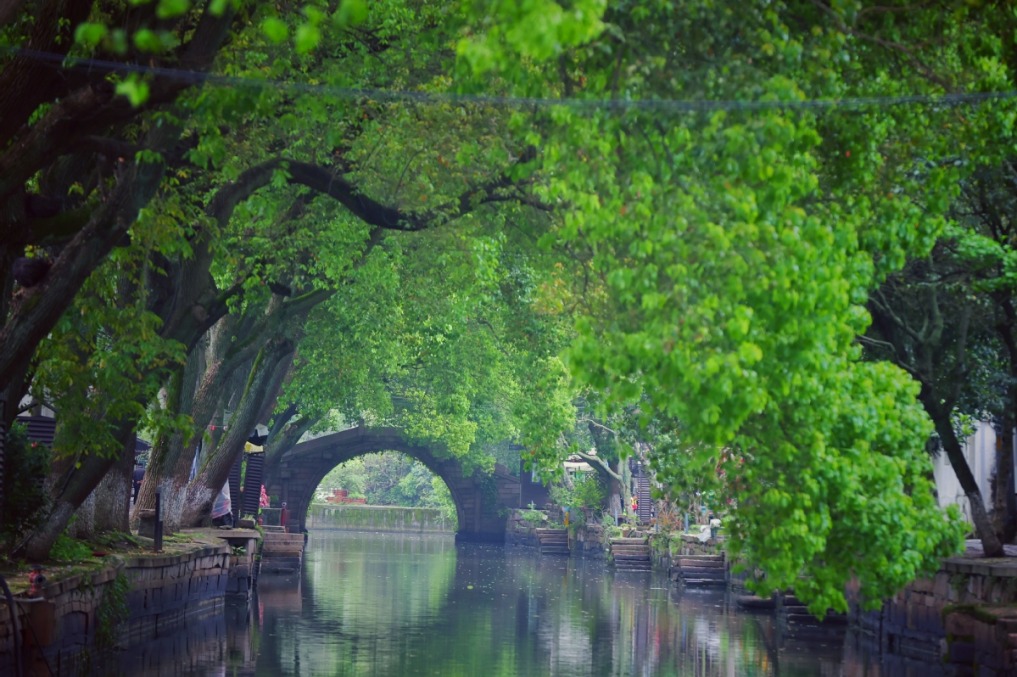New fault line? 导致两个阵营分歧的“断层线”
中国日报网 2019-04-26 10:53

Reader question:
Please explain “fault line” in “a new fault line is emerging among Democrats…”?
My comments:
In this example, fault line may refer to something, namely a controversial issue that may divide Democrats, splitting them into two camps, one for, one against.
Originally, fault line is a geological term referring to the line on the surface of a large rock along which the rock breaks into two. The fault line traces what is known as a geological fault underneath. Without sounding too techy and boring, I think that’s about it.
Well, geographically speaking, faults and fault lines are a big deal. After a huge earth quake, for example, sometimes the surface of the earth gaps open, splitting rice fields or superhighways into two. That’s the kind of force with which geological faults unleashes.
Metaphorically speaking, a fault line refers to something that resembles a geographical fault, which may lead to a major rift, a big split within an organization.
In other words, a very divisive political issue.
Or different opinion that may lead to serious consequences.
Currently, for example, US Democrats are debating about whether they should impeach President Donald Trump now or later or never. Doing it now, knowing they cannot win (because even though the House of Representatives is controlled by Democrats, the Senate is controlled by Trump’s Republicans) does not sound like a good proposition. Doing it later or never doesn’t sound exactly right either, making many feel like they’re reneging on their Constitutional duties.
Without getting further into all the muddy complexities of American politics, let’s just be satisfied to know that this issue is one of quite a few fault lines dividing Democrats, making them less united than they would like to be when it comes to fighting Trump and Republicans.
Here, let’s read a few media examples of “fault line” as a divisive political issue:
1. Debates about whether the United States should intervene in wars fought in other countries; African Americans, women and other minority groups demanding equal rights; citizens resenting the federal government’s encroachment into their daily lives; and the government cracking down on those who dare question the rightness of the U.S. approach to national emergencies.
That list of controversies may sound as timely as this morning’s news report. But as the PBS “American Experience” six-hour documentary special, “The Great War” makes disturbingly clear, such deep divides are, in many ways, the same old American story.
“The Great War” is timed to mark the 100th anniversary of America entering World War I, on April 6, 1917. As one of the interview subjects says early on, World War I – which at the time was called “the war to end all wars” – is the most important historical event people don’t know about.
The filmmakers, Steven Ives, Amanda Pollak and Rob Rapley, are working on a vast canvas. Over the three nights “The Great War” airs on PBS, the film covers, among other topics, the horror of World War I trench warfare; the staggering casualties; the romantic idealists who wanted to fight because they thought it noble; the dawn of using celebrities to drum up support for a cause (Charlie Chaplin and others helped sell “Liberty Bonds”); the deadly flu epidemic that added to the suffering during wartime; and the roles played by diverse groups such as Native American “code talkers” in the war effort.
It’s all utterly fascinating and makes the six hours fly by. But where “The Great War” is most compelling is in its highly detailed portrait of what the U.S. was like before World War I – in 1914, the U.S. Army ranked seventeenth in the world, behind Serbia, as the documentary tells us – and how the conflict transformed the U.S. on the homefront and on the global stage.
While war was breaking out in 1914 Europe, with Germany and it allied countries fighting the United Kingdom, France, Russia and other allies, the U.S. was torn.
Resistance against joining the conflict was strong in the U.S., where the huge wave of immigrants who came to America from Europe had little desire to fight to protect countries they had fled.
“The Great War” paints an especially complex picture of President Woodrow Wilson. After three-and-a-half years of official American neutrality, Wilson finally concluded that the U.S. must enter the war because, as he famously said, “The world must be made safe for democracy.” But this was the same man who, for all his professed progressive ideals, was a staunch segregationist.
By the time World War I ended in 1918, the U.S. had ascended to the status of world power that it has maintained ever since. Along the way, the role of the federal government grew, as did official intolerance for dissent.
Americans came to feel watched, as one expert notes. Pressure was high to conform to wartime rules. If someone griped about food restrictions, for example, a neighbor might rat you out. Free speech was considered less important than repeating the government line. And German-Americans, even if they had been born here, were regarded with suspicion, and pressured to abandon any traces of German culture.
As the filmmakers and their interview subjects (who include Oregon-based podcaster Dan Carlin and Kimberly Jensen of Western Oregon University) tell it, the fault lines that shake America’s foundations today can be traced back to a global conflict that, rather than bringing peace, launched a new era of world disorder.
- WOU in the news: ‘The Great War’: PBS documentary finds haunting parallels between World War I and U.S today (review), WOU.edu, April 6, 2017.
2. Red state, blue state. Conservative, progressive. Small government, big government. Among all the familiar fault lines in American politics, says Jonathan Rodden, Stanford professor of political science, the one with the deepest implications is the stark, growing divide between rural and urban voters.
“We’re at a moment of extreme geographic sectionalism,” Rodden told a group of students as part of the Moving Forward After Political Confrontation series at Stanford Graduate School of Business, spearheaded by Saumitra Jha, a professor of political economy. “The question about political polarization in the United States, the question about where we are, what’s happening in the United States after this last election, is all about geography.”
Rodden says his research on geographic polarization shows a striking correlation between population density and voting behavior that grows stronger with each passing election. In short, he says, Democrats are becoming an exclusively urban party.
“Whether it has to do with income, or whether it has to do with race, or whether it has to do with economic decline, it is the case that there is a very pronounced spatial organization of the electorate of the United States,” Rodden says.
“As you go from the center of cities out through the suburbs and into rural areas, you traverse in a linear fashion from Democratic to Republican places.”
He also says that this correlation between population density and Democratic voting persists no matter the size of the municipality. “It’s true of the states, it’s true of the counties, and, most important, it’s true at the level of precincts,” Rodden says.
It’s not just that a densely populated state like New York tends to vote Democratic, or that densely populated counties do. Even small towns are far more Democratic than their surrounding rural areas. And tightly packed suburbs vote more Democratic than suburbs with more widely spaced homes do. And the trend has accelerated across the country in recent years.
Rodden says that this battle pitting a set of urban interests against a set of rural interests didn’t happen overnight and isn’t unique to American politics. However, the severity of the problem is. This, he argues, largely stems from the fact that American politics is dominated by only two parties and features a geographic system of representation. As long as this geographic polarization continues and Democrats remain an urban party, he says, they will continue to be dramatically underrepresented in legislative bodies.
Creatively drawn districts that benefit Republican majorities aren’t the main culprits, Rodden says. Rather, the simple fact that districts are drawn at all disadvantages Democrats.
“When you draw winner-take-all districts, it ends up overrepresenting Republicans,” Rodden says. “This is something that we often blame on gerrymandering, but it’s only strengthened and furthered by gerrymandering. We end up with a lot of bias against Democrats purely because of this spatial arrangement of politics.”
Rodden says the election of Donald Trump as president is just one manifestation of the divide between urban and rural voters. “This is going to be a new fault line in politics in lots of places,’’ he says. “European politics is increasingly going to be a battle between urban, young intellectuals, greens, people who support the European Union — and a rural coalition that wants to pull out of the European Union.” The question becomes what can be done about it?
- Political Polarization’s Geographic Roots Run Deep, Stanford.edu, May 2, 2017.
3. THE opening of new political fault lines in UK politics have exposed the BBC to renewed allegations of bias, according to Director General, Tony Hall.
In his Society of Editors’ Satchwell Lecture, he explained these went beyond the inevitable criticisms facing a publicly funded, public service broadcaster.
“The political divisions that have opened up in recent years – on the Scottish referendum, of course, but most notably on Brexit – have led some politicians to try to portray the BBC as being in sustained opposition to their particular cause,” he said.
“People who try to undermine the BBC’s reputation for their own political ends should be careful what they wish for. Nobody wants to end up in the highly polarised, almost separate, political and media cultures we see across the Atlantic. Nor the mono-cultural landscape of State-run media in some other countries. And nothing will shake our determination to report what we find, and to put claims and counter-claims into a context that helps audiences understand and assess them. “
He believes there is still ‘a really healthy political debate’ in this country, and is confident the BBC continues to hold people in power to account, but is concerned at the way media choices have become more fragmented at the same time as politics is becoming more polarized.
The danger is that people are increasingly loyal to particular news services – often quite niche ones – and can tailor what they receive only to reflect their particular world view.
“So we have to be cautious about perceptions of impartiality among users,” said Lord Hall. “It’s quite easy to persuade a small number of like-minded people that news output targeted at them is impartial. And much more difficult to achieve that with large numbers of people – reflecting a whole range of views and opinions. “
He acknowledges that this shifting landscape poses particular challenges for the BBC but is adamant its impartiality is one of its most precious assets. “At its most basic, it means BBC journalism is accurate, fair – and based on the best evidence we can find. For us, impartiality is critical to trust. And it’s not easy to achieve.
Lord Hall also touched on the threats posed by contracting budgets at the BBC, something he described as ‘a growing and inescapable challenge’.
Despite having the ‘immense privilege’ of running a broadcaster world-renowned for quality, he its wide-ranging work all has to be produced ‘on an annual budget that wouldn’t keep some of our competitors in business from now until Christmas’.
“For us the cracks are beginning to show… and, for all our differences and debates, anyone who cares about this country’s stories and ideas should want more investment in our content right now – not less.”
- New political fault lines expose BBC to bias allegations says Director General, SocietyOfEditors.org, October 9, 2018.
本文仅代表作者本人观点,与本网立场无关。欢迎大家讨论学术问题,尊重他人,禁止人身攻击和发布一切违反国家现行法律法规的内容。
About the author:

Zhang Xin is Trainer at chinadaily.com.cn. He has been with China Daily since 1988, when he graduated from Beijing Foreign Studies University. Write him at: zhangxin@chinadaily.com.cn, or raise a question for potential use in a future column.
(作者:张欣 编辑:丹妮)

















 英语点津微信
英语点津微信 双语小程序
双语小程序